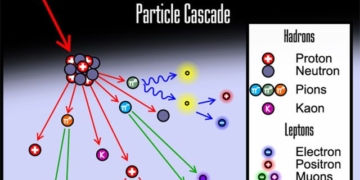It turns out that stepping on peanut plants is not as harmful as many people believe.
Peanut (Arachis hypogaea), also known as groundnut, is widely cultivated in rural areas of Vietnam due to its high economic efficiency, ability to enhance soil fertility, and low maintenance requirements. Peanuts can be planted in two seasons: the spring-winter season and the summer-autumn season; in the midland areas with good drainage, farmers can even plant in the autumn-winter season.
Globally, over 100 countries grow peanuts. Peanuts rank second after soybeans in terms of both planting area and production. The peanut plant is well-known among the Vietnamese population, producing an annual yield of 530,000 to 550,000 tons.
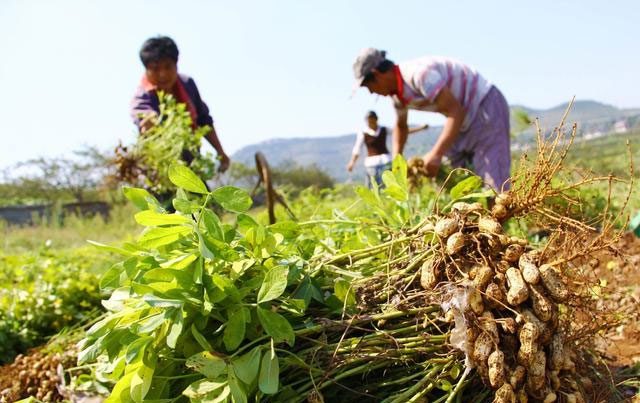
Over 100 countries grow peanuts due to their high economic efficiency. (Photo: Sohu)
In China, peanuts are planned as one of the main crops in many regions. China is the largest producer of peanuts in the world, primarily processing them for oil.
According to the USDA, China ranks second after India in terms of peanut planting area with 5.1 million hectares, accounting for 22.4% of the world’s total peanut planting area, yet it leads the world in production with 15.1 million tons.
Strange Actions in Peanut Fields
In China, during the peanut flowering season, a peculiar scene often unfolds in the fields: farmers compete to step on peanut plants. Why do they do this just before harvesting? Does this action hold a different significance?
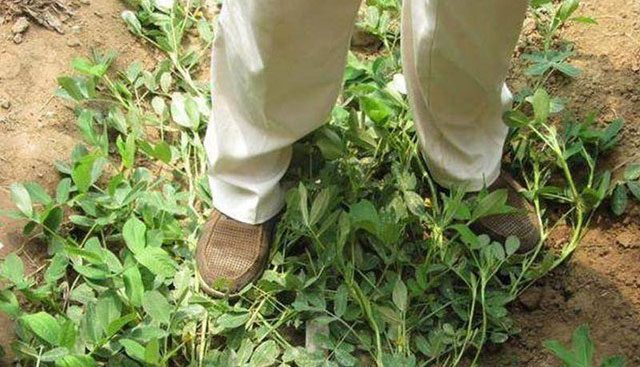
Farmers compete to step on peanut plants during the flowering season. (Photo: Sohu)
According to experts studying peanuts, this practice by farmers is actually harmless and has three benefits.
First, it helps shorten the distance between flowers and the ground. Stepping on peanut plants does not break them because their stems are soft and flexible. Instead, when peanuts are pressed down close to the ground, it increases the contact area, making it easier for pollen to transfer and promoting better fruit set.
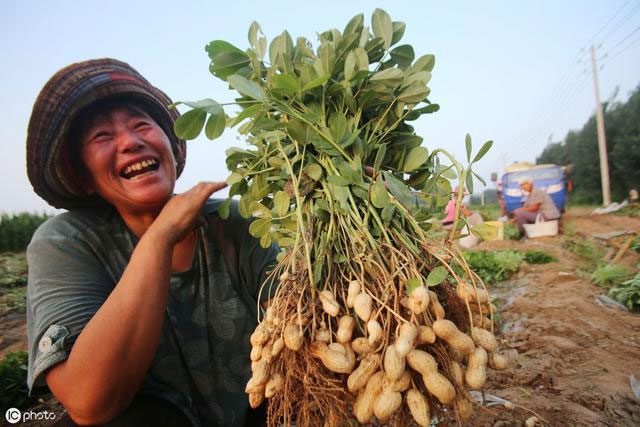
Stepping on peanut plants is actually harmless. (Photo: Sohu)
Second, it controls the growth rate of peanut plants. Peanuts, like sweet potatoes and potatoes, have their foliage above ground while their fruits grow underground. This relationship is not only symbiotic but also competitive for nutrients. If peanut plants grow too quickly, the fruits may lack nutrients and be of poor quality. For other crops, the solution is pruning, while for peanuts, it involves stepping on them. This action can damage branches and leaves to a certain extent, but it allows nutrients to concentrate in the roots.
Third, it promotes the fruiting process. Peanuts have a unique fruiting habit. Peanut flowers (usually yellow) grow at a low part of the stem. After pollination, the flower develops into a long tube that grows downward. The tip of this tube contains the peanut pods, which penetrate the ground to develop. During growth, this post-pollinated flower needs to grow horizontally above the ground. If the peanut plants grow too tall, the pollinated flowers struggle to penetrate the soil for fruit development. Stepping on the plants can lower their height close to the ground, thus facilitating the flowers’ entry into the soil and achieving higher yields.
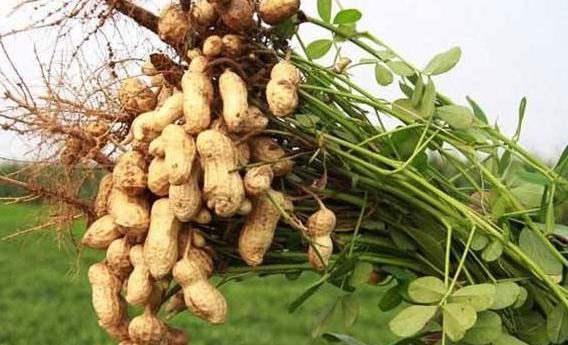
Stepping on peanut plants can help increase their yield. (Photo: Sohu)
Best Time to Plant Peanuts
Botanical literature states that peanuts are a valuable source of protein and vegetable oil (second only to soybeans). Peanut seeds are highly nutritious. In every 100g of peanuts, there are: 7.5g water; 27.5g protein; 44.5g lipids; 15.5g carbohydrates; 2.5g fiber; 2.5g ash; and minerals: Ca 68mg; P 420mg; Fe 2.2mg; Mg 176mg; Mn 2.1mg; K 658mg; Zn 3mg; Cu 0.7mg; vitamins: vitamin E 0.44mg; B2 0.12mg; niacin 16mg; vitamin E 1mg; and leucoanthocyanins that help with hemostasis.
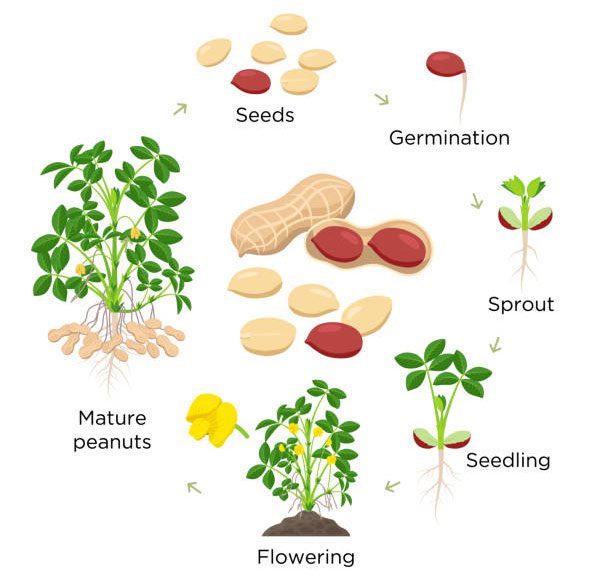
Peanuts are considered a valuable source of protein and vegetable oil. (Photo: Pixabay)
Traditional Chinese medicine believes that peanuts have effects such as tonifying the spleen and stomach, boosting qi, nourishing blood, stopping bleeding, moistening the lungs, resolving phlegm, promoting bowel movements, and increasing milk production. Peanut oil is suitable for those with poor appetite, malnutrition, stomach pain, cough with phlegm, bleeding disorders, and lactating women with insufficient milk. Research shows that those who regularly consume peanuts have a lower risk of cardiovascular diseases. Peanut seeds contain more protein than any other vegetable or legume. This makes peanuts a necessary food for children’s growth, nutritional balance for vegetarians, and those on low-meat diets.
Peanuts are commonly planted by sowing seeds due to their high economic efficiency, low maintenance, and wide usage in daily life. Being a short-term industrial crop, they are easy to grow and suitable for intercropping, improving soil, and play an important role in crop structure transformation.
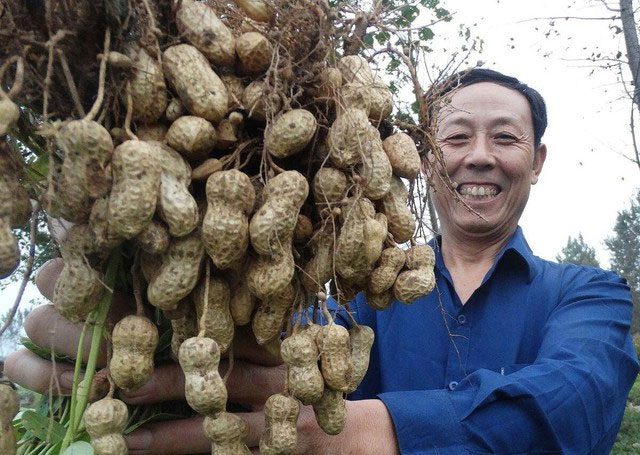
Peanuts are commonly planted by sowing seeds due to their high economic efficiency. (Photo: Sohu)
The growth period for peanuts is approximately 100-130 days. The peanut pods start from flowering, pollination above ground, forming a fruit stem that quickly penetrates the soil at a depth of 3-7 cm and expands horizontally to form pods. Peanut planting techniques must create conditions for concentrated flowering (the peak flowering period lasts only about 10-15 days) and facilitate the development of the fruit stems.
The best planting seasons for optimal growth and development are the spring-winter and summer-autumn seasons.

Peanut seeds contain more protein than any other vegetable or legume. (Photo: Sohu).
The most suitable time to step on peanut plants is on sunny afternoons, after 3 PM. After a morning of sunlight, the stems have become softer and more pliable, so stepping on them will not break the plants. At this time, farmers can step on the peanut plants while they remain upright.
According to farmers, while stepping on peanut plants requires effort and is only feasible for small quantities, this method poses no health risks, saves on herbicides, and, notably, allows peanuts to achieve good yields without chemical agents. Chinese experts, upon learning this information, also believe that stepping on peanut plants after the flowers have been pollinated is a good practice to adopt.



















































